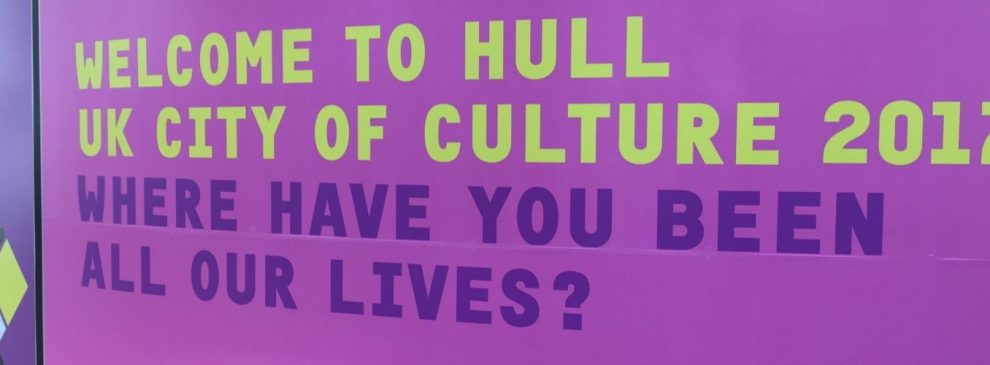Cultural Policy, Professional Ethics and the Public Good
Added on Thursday, December 13th, 2018
It was my great pleasure to host the Cultural Policy, Professional Ethics and the Public Good research seminar at the University of Hull on 13th November 2018, in collaboration with the university’s Institute of Applied Ethics (IAE). As UK City of Culture 2017, Hull engaged in its own strategic process of aligning cultural and creative assets with broader urban policy agendas including economic and social regeneration. The main purpose of the event was to debate the ethical limitations of instrumental cultural policy discourse and professional implications for arts and cultural sectors.
I opened the seminar with a keynote presentation on my current Instrumental Values study, which is examining ethical dimensions of collaborative practice between museum and library sectors and partner agencies working in two priority public policy areas, including public health and wellbeing and prison education reform. This was followed by a panel discussion, Chaired by the IAE’s Professor James Connelly, with guest panellists including Professor Franco Bianchini, Director of the Culture, Place and Policy Institute, University of Hull; Sean McAllister, BAFTA-nominated documentary filmmaker and Creative Director of the Hull 2017 opening ceremony; and Julia Weldon, Director of Public Health, Hull City Council.
Instrumental Values: Professional ethics in collaborative cultural work
Focusing on ethnographic fieldwork with prison library case studies as microcosms of truly integrated cultural work with a social purpose, my paper summarised selected, indicative research findings and emerging discussion points. These related to the ethics of advocating a cross-government policy function for arts and culture, and the imperative to create more nuanced policy and practice narratives on the professional complexity of socially engaged, multidisciplinary cultural work.
Indicative research findings included commentary on the unanticipated complexity of such cross-sector collaborations, which I have discussed in an earlier project blog post. Linked to this, the research has found considerable examples of work assimilation across professional boundaries in the cultural community of practice, ranging from mundane day-to-day requirements of the prison estate to more concerted examples of prison library staff going ‘above and beyond’ the more conventional expectations of cultural work.
Such collaborative complexity and work assimilation – especially concerning the role and huge contribution of the third sector, charitable organisations and volunteers – encourages enhanced experiences of emotional labour and care within the relevant community of practice. In this context, the ‘situatedness’ of integrated cultural work is important and especially relevant in criminal justice settings, where “the instrumental and administrative processes of criminal justice are the visible workings of the system, but of equal importance are these emotional processes, or ‘underground emotion work’ undertaken by practitioners which remains largely suppressed, invisible and unacknowledged” (Knight, 2014).
Ethical implications therefore include the extent to which cultural work in criminal justice settings can be ‘regulated’ by conventional, sector-specific codes of ethics and practice at a macro level. For library and information professionals, this includes for example the revised Ethical Framework launched by the Chartered Institute of Library and Information Professionals (CILIP) in 2018. In the field, there is often a fine-balancing act between upholding the defined values of librarianship as a cultural profession and maintaining a ‘place’ in the prison system. It is difficult for example to uphold principles of intellectual freedom and equality of access to information, when books and reading materials are heavily censored in prisons and access to information is so limited to begin with (e.g. no access to internet).
At a micro level therefore, ethical practice is self-reflective and relates to personal, moral standards of ‘right and wrong’ rather than macro-level professional standards and responsibilities. As such, the research has been steered towards a ‘virtues-based approach’ to understanding ethics in integrated professional environments, including a focus on shared moral qualities and key virtues amongst practitioners (Banks and Gallagher, 2008). In this context, cultural work across prison library case studies is more discernibly informed by personally held moral values; political ideology and orientation; other professional training and development; faith and religious beliefs; and ‘life-course’ values connected with formative social and cultural experiences.
Other indicative research findings with implications for professional ethics in cultural work include risks involved when working with and as volunteers, in not having the same levels of reporting, responsibility and accountability as paid members of a workforce or structured organisation. The extent of gendered work, and subsequently gendered ethics, in the field was another significant finding. The experiences of women working in and with prison libraries reflect very particular ethical challenges and practices, both in relation to consciously managing their own behaviours and rationalising the behaviour of others towards them. Women working in men’s prisons for example reflected on how their female identity can help or potentially hinder their engagement with prisoners and prison staff. This results in considerable compromise and risk in being a woman doing this kind of work, as what can be taken as courtesy and casual indifference in one professional context would arguably be inappropriate and potentially harmful behaviour in another.
Emerging discussion points: Culture in the ‘public good’ and ‘good’ cultural work
Emerging discussion points for our seminar therefore related to the ethics of appropriating cultural work as a form of public good versus the reality of undertaking socially engaged cultural work. Despite huge efforts to promote the social value of arts and culture in cross-government policy agendas including health and wellbeing and criminal justice, the sector does not practice what it preaches in terms of professional access and equality. There are persistent structural inequalities in cultural work, concerning who gets to work in cultural and creative industries in the first place. Precarity in cultural work is another major issue. Where paid work does exist across case studies developed in the Instrumental Values study, it is usually part-time, low-paid and in many cases involves fixed-term contracts.
The ‘precariat’ don’t have an occupational identity; do work for little or no recognition or protection; are the first class in history whose educational profiles are not matched by appropriate employment opportunities; and subsequently face “a life of chronic economic insecurity” (Standing, 2016). Instrumental cultural work in criminal justice settings in particular is emotionally challenging, underpaid (if paid at all) and wholly dependent on the inherent good will of people undertaking it. This is unethical and unsustainable.
At a policy level, the recently announced government strategy for tackling loneliness provides another example of political appropriation of cultural work, that promotes a ‘community response’ yet ignores the damage done to the cultural sector and other statutory public services by austerity measures:
“The strategy highlights the value of; inter alia, libraries, museums, public transport, parks, and high streets in combating loneliness. Yet, in the course of the last 10 years, almost 500 libraries have been closed, 64 museums, 134 million miles of bus routes have been lost, parks budgets have been reduced by an average of 40%, and more than 12,000 high street outlets have closed. Further cuts have also decimated children’s centres, youth services, day care centres for the elderly, community centres, and support programmes for young parents, carers, those with mental health issues, addicts, and survivors of domestic abuse amongst many others.” (Stenning and Hall, 2018).
This is putting additional strain on third sector and charitable organisations to fill gaps in provision. Other critical, ethical questions arise therefore regarding cost, investment and value, particularly when cultural work is positioned as a cost-effective alternative to other rapidly declining state-funded interventions. A prison library-reading group for example may incur a minimal financial cost, but will invariably constitute a considerable long-term investment in terms of the multi-disciplinary skills, experience, expertise and personal commitment of staff and volunteers. In considering the value created by instrumental cultural work, the research highlights policy makers’ ethical responsibility to consider and acknowledge the true costs of making a difference.
Panel discussion: Collaborative complexity, ethics and public value
Following my presentation, guest panellists were asked to respond to the following three questions or prompts with reference to their own professional experiences with the cultural sector:
- What are your own experiences of ‘collaborative complexity’ in cultural work?
- What are the ethical implications of positioning cultural work as public service?
- How can the public value of culture be more ethically supported and represented, particularly in cultural policy discourse?
From a policy perspective, Julia Weldon (Director of Public Health, Hull City Council) shared her insightful and realist reflections as an advocate for the value of arts and culture in health and wellbeing. In her 2016 annual review, Julia focused specifically on maximising the health and wellbeing benefits of UK City of Culture. In 2017, she adopted a creative approach to sharing her annual review via the A Better Future in Mind documentary film, which focused on emotional wellbeing and good mental health in the city and referenced Hull 2017 throughout (including most notably its extensive volunteer programme).
Julia was critical of the simplistic overtures in national policy discourse, including for example references to ‘choice and personal responsibility’ in a recent speech advocating arts-based social prescribing by the Health and Social Care Secretary, Matt Hancock. As Julia observed, choice is not equal in society and it is naïve to assume that social prescribing will ‘miraculously’ become a sustainable and stable solution for communities. Reflecting on her own experiences, she commented on the value of having ‘like-minded people in the city’, including a positive synergy between public sector and commercial sector (business) leadership, as well as within and across different local authority departments. This is especially crucial as the needs and expectations of the public health workforce are changing, requiring a ‘policy shift’ to value our care workers in particular.
From an academic perspective, Prof. Franco Bianchini commented on a ‘theoretical laziness’ in cultural policy research with regards to understanding collaborative work, with the Instrumental Values study going some way to address this (thank you Franco!). Traditionally, this has not been a dialogue between equals, as “economists know more about the economy than artists”. Richard Florida for example successfully hijacked the ‘creative city’ concept, as his argument was framed in the language of economists.
Reflecting anecdotally on the role of the third sector and voluntary work, Franco suggested that many Hull 2017 projects would not have been delivered without volunteers, with over 2,000 volunteers still active in the city since 2017. Cultural leaders of the programme effectively used the local, voluntary workforce to overcome resistance to the programme and legitimate its value. Despite any ethical concerns about the extent to which cultural work is underpinned by volunteers, they therefore served another more political, intermediary function to the ‘success’ of Hull 2017 and are a key exemplary part in the city’s ongoing public health strategy.
Positioning cultural work as public service is ultimately problematic, according to Franco, if dismissing the critical function of cultural work, that being its capacity to question or critically interrogate public policy making, subversively or otherwise. This affects the position of cultural work itself, with cultural workers across Europe effectively becoming ‘the enemy’ through the risk that they expose the factional realities of public life. Regardless, this should be part of the function of cultural public service.
*I first became an Associate of the IAE in 2016, when developing my research interests in professional ethics. The IAE network and programme of events have been invaluable in supporting my research. I’m especially grateful to the IAE’s Prof. Colin Tyler, Emma Webster and Tom Davey-Rogerson for hosting the ‘Cultural Policy, Professional Ethics and the Public Good’ seminar and helping to bring it together. Thanks also to IAE network members and other delegates who attended the event and contributed to our lively open floor Q&A discussion. The seminar was funded by the Arts and Humanities Research Council (AHRC) as part of my AHRC Leadership Fellowship 2017-19. Notes from the event will be incorporated into the Instrumental Values research project.*









